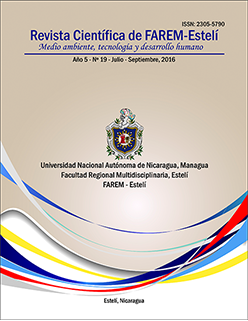Incidence of evaluation practices in the teaching-learning of the subject Mathematics II, at Universidad Nacional de Ingeniería (UNI-RUACS), Estelí, Nicaragua, 2015
DOI:
https://doi.org/10.5377/farem.v0i19.2970Keywords:
Evaluation practices, teaching-learning process, action lines.Abstract
The evaluation of learnings is still a topic of great interest, as it creates a stimulus towards the learnings. Every evaluation act conveys a message to each student about what they should be learning and how. Educational changes aim to establish a difference between evaluation of learnings from its summative intention towards an interventionist position that contributes to improving the teaching-learning process of Mathematics II, implementing integral evaluation strategies that facilitate the acquisition of meaningful learning, far from memorization and repetition. The main objective of the study was to value the incidence of the evaluation practices on the teaching-learning process of the subject Mathematics II, at UNI-RUACS, Estelí, period 2015. The mixed methods design was followed, with emphasis on the qualitative design. The population consisted of 5 teachers and 266 students. The simple was made up by 5 teachers and 135 students. The data collection methods were: an interview, a survey, an observation and a document analysis. The main research results show that the evaluation practices in Mathematics II have been modified in a low degree. Moreover, the teachers understand the term ‘evaluation’ as a process, but in real life it is only used at the end of the class, in order to set a final score and to measure students’ learnings. The self-evaluation and co-evaluation are absent in the evaluation process, limiting the acquisition of meaningful learning. This study is expected to contribute to widening aspects related to this topic, and serve as a reference for further research.
Downloads
881
Downloads
Published
How to Cite
Issue
Section
License
© Revista Científica de FAREM-Estelí

